![a0060[1]](http://avivahwerner.com/wp-content/uploads/2015/08/a00601-300x225.jpg) Four years ago today, our family got off the plane at the airport in Tel Aviv to start our lives in Israel.
Four years ago today, our family got off the plane at the airport in Tel Aviv to start our lives in Israel.
We packed a lot of living into this time and it’s hard to believe so much could happen in only four years!
It’s been good but it hasn’t always been easy. My sense of competence, identity, and contribution were shaken repeatedly as we faced health struggles, educational struggles and financial struggles. Sometimes it felt overwhelmingly hard but for the most part we tried to roll with the punches and live life on life’s terms. Even at the hardest times there were always plenty of things to appreciate about living here.
As we mark four years of being here, I am continually filled with gratitude and awe that we’ve merited to make this incredibly special country our home.
“That all sounds nice,” you may say. “But what about your kids?”
Coming with nine children ranging in age from 18 – 2, many told us we were brave (though I’m sure foolhardy is the word that was rustling around in their minds!).
We knew the odds of successful transition with kids above age 10 aren’t good. We weighed this information and despite having five kids at the time in the problematic age range, made the decision to come with the belief that as a strong family unit, together we would weather whatever was to come. Our family unit was tested again and again but it was this strength that pulled us all through. I feel overwhelming gratitude and humility that becoming part of these statistics wasn’t one of our challenges; I don’t take that for granted.
I asked my kids if knowing how hard it was going to be, they regretted moving to Israel? Every single one of them told me they’re very happy to be living here, and the older kids told me the difficult experiences helped make them who they are now.
Here’s a brief aliyah related update on my kids at this point:
Ds22 moved here right after his 18th birthday. He went directly to a yeshiva for English speakers and this is where he continues studying today.
Dd20 was almost 17 when we moved here and went to high school for a year, then to seminary in the US for a year. She is working and now applying to *Israeli college programs for religious women for the coming year, which she plans to combine with working. Her Hebrew is decent. (*When I use the term Israeli, I mean it’s a Hebrew speaking institution that isn’t geared towards the Anglo population.)
Dd19 moved here a couple of weeks after turning 15 and went into tenth grade at an Israeli high school. She skipped eleventh grade and graduated high school in two years. She then went to an Israeli seminary for the first year, then to an American seminary for her second year while simultaneously attending a women’s college program for industrial design. She has one year remaining before completing her design studies. She is completely fluent in Hebrew and socially comfortable with Israelis.
Ds16 moved four months before his bar mitzva. He was skipped into eighth grade where there were two other English speakers in his class rather than put him in the seventh grade where he would have been the only English speaker. We then kept him in the eighth grade for a second year so he’d be in the right grade for his age group. He went on to an Israeli yeshiva high school with a rigorous Torah and secular curriculum where he’s been very successful. He is completely fluent in Hebrew and socially comfortable with Israelis.
Dd14 moved here when she was almost 11. She went through two years of school before we pulled her out to homeschool for the next two years. Next week she will start at an Israeli high school. Her Hebrew isn’t strong right now but we expect with the solid language foundation that she has, combined with her desire to learn and being in a Hebrew social environment that she’ll become fluent in Hebrew within a year or so.
(Social and cultural integration is an important factor for us in choosing schools for our children.)
Ds13 arrived here as a nine year old, and was completely traumatized after a year and a half in school. He’s been homeschooling for the last 2.5 years. We’re beginning to consider potential schools for him for high school but we have a year until that time. His Hebrew comprehension is good and if he needs to speak Hebrew he can say what he needs to. It’s at the level that he’ll take off very quickly once he’s in a Hebrew speaking environment.
*Notice that it’s not the younger kids who picked up the language quickly, despite being in a completely Hebrew-speaking school environment. Yes, I have an explanation for that but I won’t share it right now. 🙂
Ds9 came as a five year old and went straight into kindergarten. He picked up the language quickly and is an incredible reader in Hebrew. (He also reads English at an age appropriate level but nothing near his super speed in Hebrew.)
Ds7 (for a couple more weeks :)) was almost four when we moved. He went into gan, which he hated. We pulled him out in late winter, then put him back in pre-kindergarten for the following year. He had fluid in his ears for the second half the year and this kept him from hearing well enough to pick up the language well. He speaks well enough to socialize and I continue to work on this at home.
Ds6 was 2.5 when we moved. He stayed home with me until he was 3.5, then went to gan for a few months. I traded easy language acquisition in gan for more time at home in the early years. Totally worth it. His comprehension is improving constantly.
Ds3 was born ten months after we moved so there’s not much to say about his aliyah process. 🙂
Sometimes I wonder how we had the courage to leave behind a pleasant and fulfilling life to start all over. It was a spiritual choice based on the belief that as good as our lives were, they could be better living here – and they are.
Avivah

![a0060[1]](http://avivahwerner.com/wp-content/uploads/2015/08/a00601-300x225.jpg)


